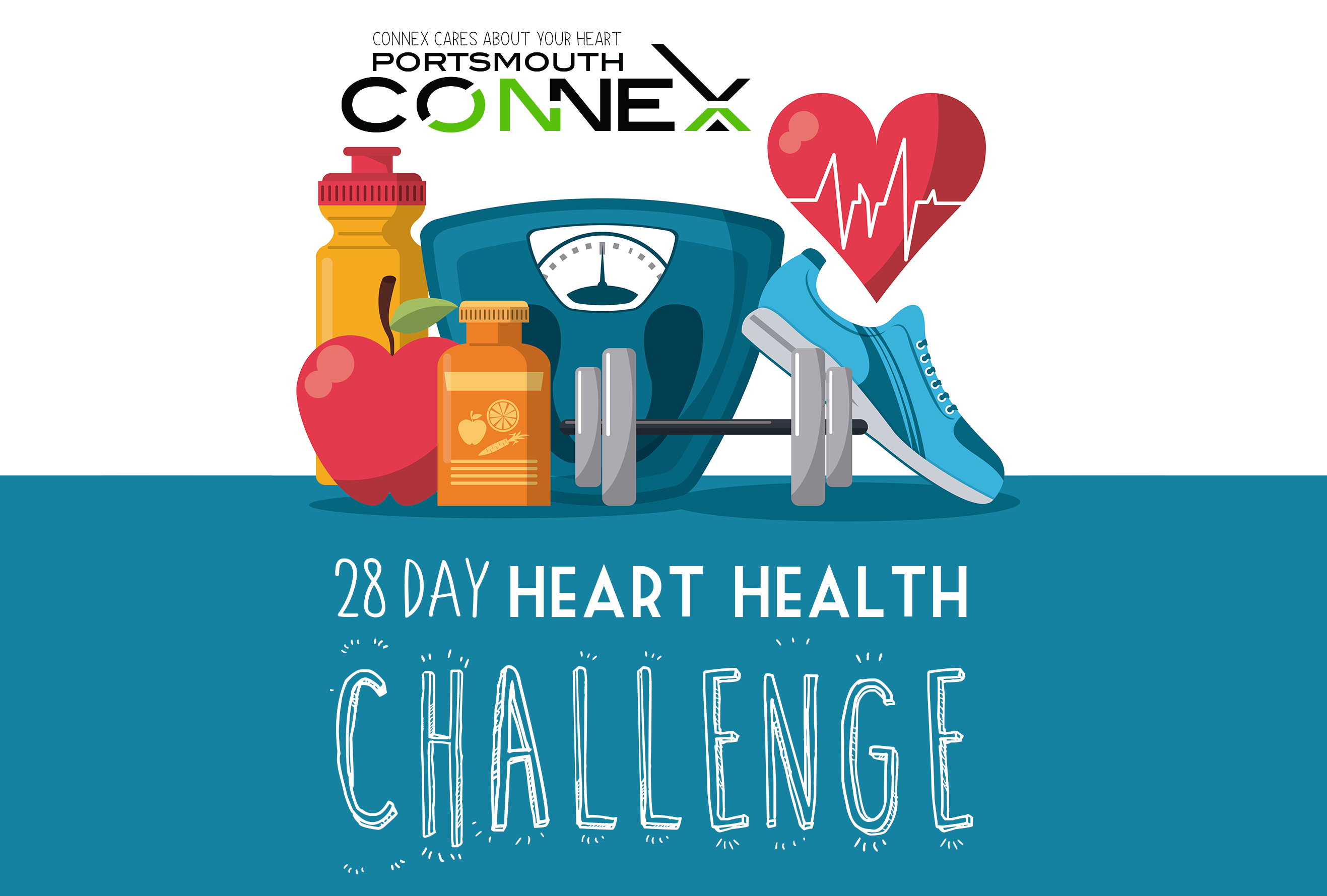
Heart Health
28 Day Heart Health Challenge.
Connex cares About your Well being. In honor of Heart Health Awareness Month, we created a calendar of activities to complete during the Month of February. However, this “28 Day Heart Health Challenge” can be created at anytime.
 Drink 32oz. of Water or more
Drink 32oz. of Water or more
Water makes up about 60% of your body weight and 72% of your brain. Every cell, tissue, and organ in your body needs water to work properly to regulate your temperature, fight fatigue, as well as lubricates and cushions your joints. Water is also critical for your heart health. Your heart is constantly working - pumping about 2,000 gallons of blood a day. By drinking more water than you are losing, you are helping your heart do its job.
It is recommended to drink 1/2 of your body weight in ounces. For example, someone who weighs 120 lbs would want to drink at least 60 fluid ounces a day.
 Listen to Calming Music
Listen to Calming Music
One of the top physical effects of listening to relaxing music is the ability to improve heart health. Listening to such music helps your blood flow easier throughout your body. The right music also helps your heart decrease the speed at which it beats to lower your blood pressure. This type of music can also be great for ambient noise.
Don’t have meditation music in your playlist? Not a problem. YouTube offers an array of relaxing music that can be played commercial-free for hours on end.

Drink 32oz. of Water or more
Water makes up about 60% of your body weight and 72% of your brain. Every cell, tissue, and organ in your body needs water to work properly to regulate your temperature, fight fatigue, as well as lubricates and cushions your joints. Water is also critical for your heart health. Your heart is constantly working - pumping about 2,000 gallons of blood a day. By drinking more water than you are losing, you are helping your heart do its job.
It is recommended to drink 1/2 of your body weight in ounces. For example, someone who weighs 120 lbs would want to drink at least 60 fluid ounces a day.
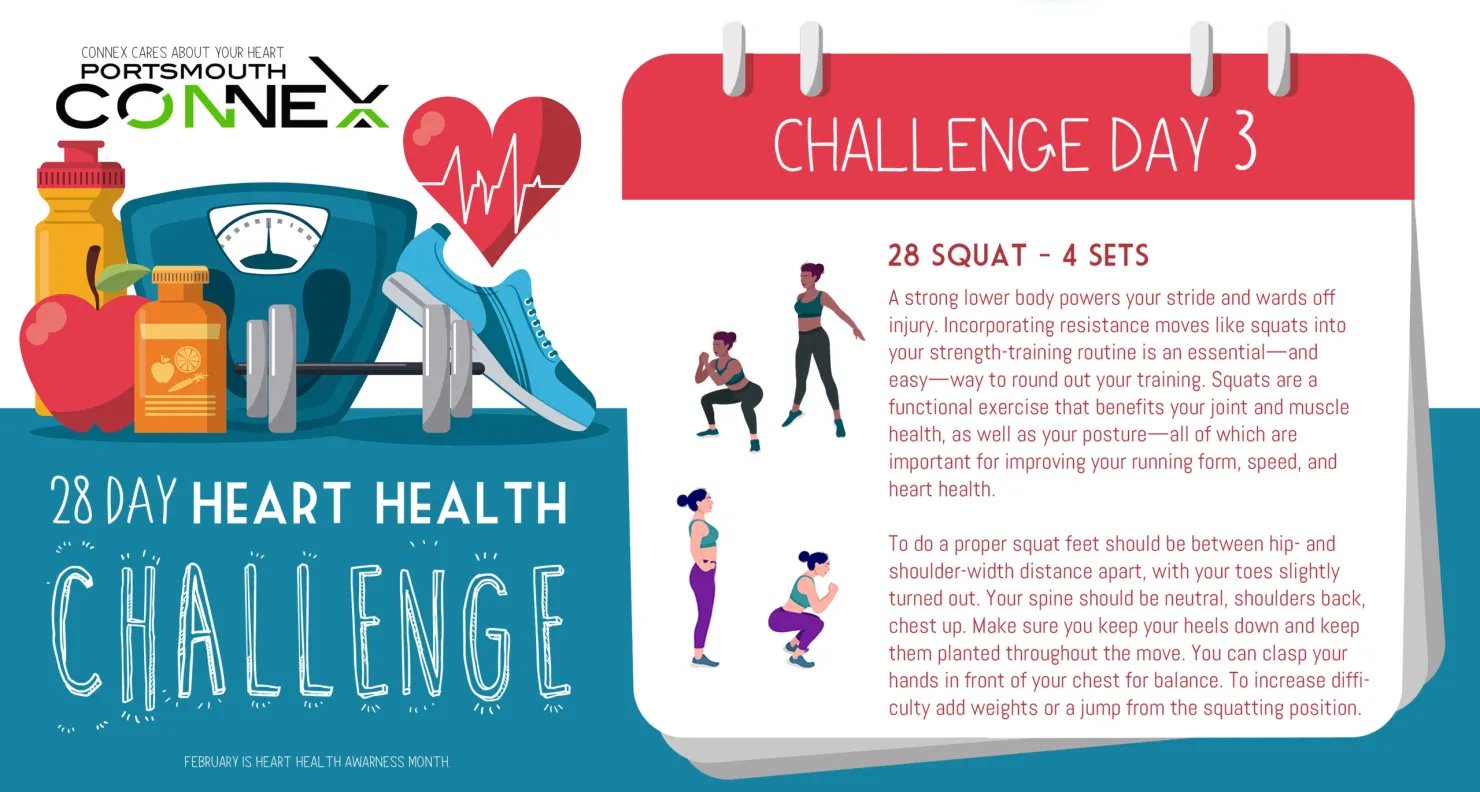 28 Squat - 4 sets
28 Squat - 4 sets
A strong lower body powers your stride and wards off injury. Incorporating resistance moves like squats into your strength-training routine is an essential—and easy—way to round out your training. Squats are a functional exercise that benefits your joint and muscle health, as well as your posture—all of which are important for improving your running form, speed, and heart health.
To do a proper squat feet should be between hip- and shoulder-width distance apart, with your toes slightly turned out. Your spine should be neutral, shoulders back, chest up. Make sure you keep your heels down and keep them planted throughout the move. You can clasp your hands in front of your chest for balance. To increase difficulty add weights or a jump from the squatting position.
 Drink 32oz. of Water or more
Drink 32oz. of Water or more
Water makes up about 60% of your body weight and 72% of your brain. Every cell, tissue, and organ in your body needs water to work properly to regulate your temperature, fight fatigue, as well as lubricates and cushions your joints. Water is also critical for your heart health. Your heart is constantly working - pumping about 2,000 gallons of blood a day. By drinking more water than you are losing, you are helping your heart do its job.
It is recommended to drink 1/2 of your body weight in ounces. For example, someone who weighs 120 lbs would want to drink at least 60 fluid ounces a day.
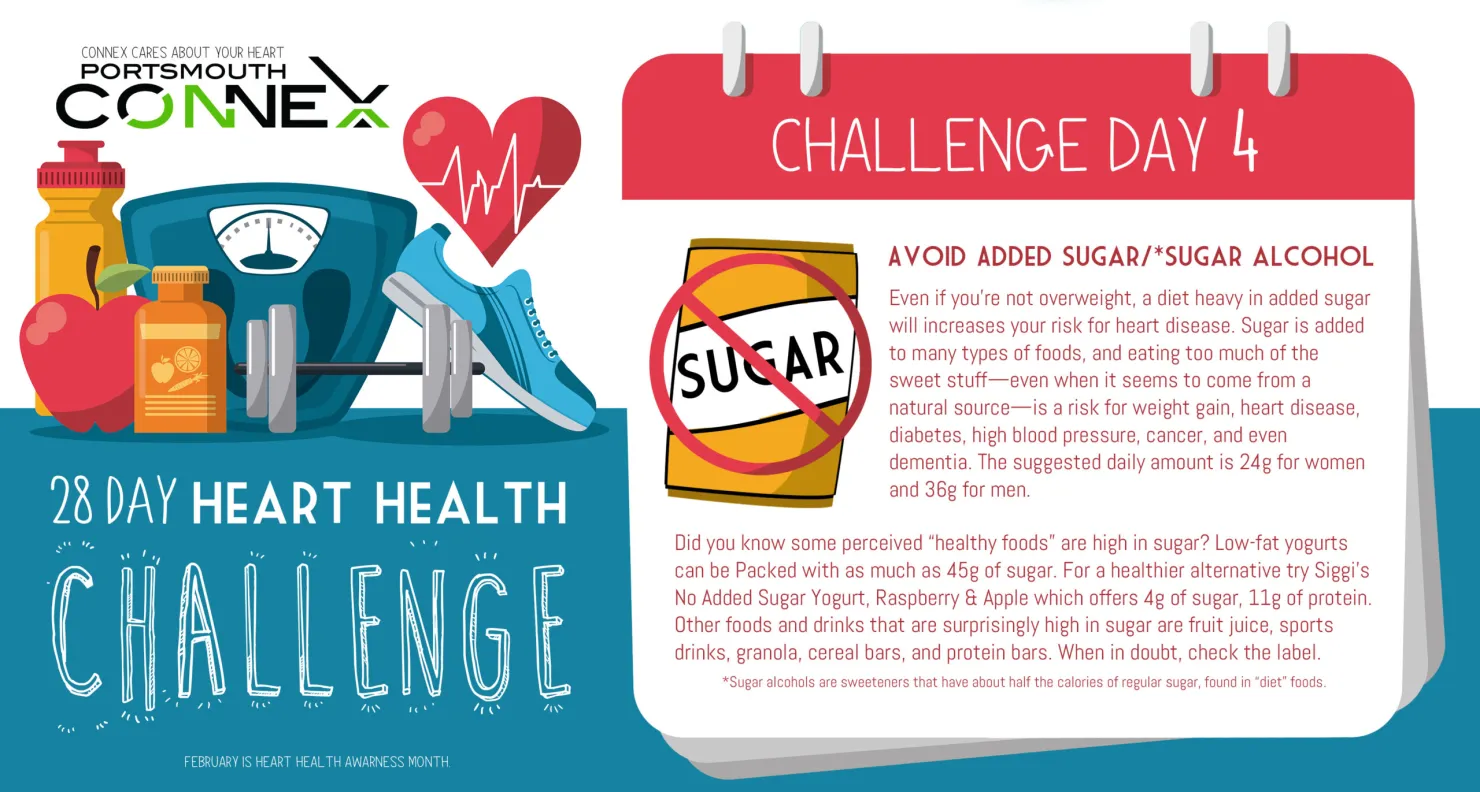 Avoid Added Sugar/*Sugar alcohol
Avoid Added Sugar/*Sugar alcohol
Even if you're not overweight, a diet heavy in added sugar will increases your risk for heart disease. Sugar is added to many types of foods, and eating too much of the sweet stuff—even when it seems to come from a natural source—is a risk for weight gain, heart disease, diabetes, high blood pressure, cancer, and even dementia. The suggested daily amount is 24g for women and 36g for men.
Did you know some perceived “healthy foods” are high in sugar? Low-fat yogurts can be Packed with as much as 45g of sugar. For a healthier alternative try Siggi's No Added Sugar Yogurt, Raspberry & Apple which offers 4g of sugar, 11g of protein. Other foods and drinks that are surprisingly high in sugar are fruit juice, sports drinks, granola, cereal bars, and protein bars. When in doubt, check the label. *Sugar alcohols are sweeteners that have about half the calories of regular sugar, found in “diet” foods.
 Drink 32oz. of Water or more
Drink 32oz. of Water or more
Water makes up about 60% of your body weight and 72% of your brain. Every cell, tissue, and organ in your body needs water to work properly to regulate your temperature, fight fatigue, as well as lubricates and cushions your joints. Water is also critical for your heart health. Your heart is constantly working - pumping about 2,000 gallons of blood a day. By drinking more water than you are losing, you are helping your heart do its job.
It is recommended to drink 1/2 of your body weight in ounces. For example, someone who weighs 120 lbs would want to drink at least 60 fluid ounces a day.
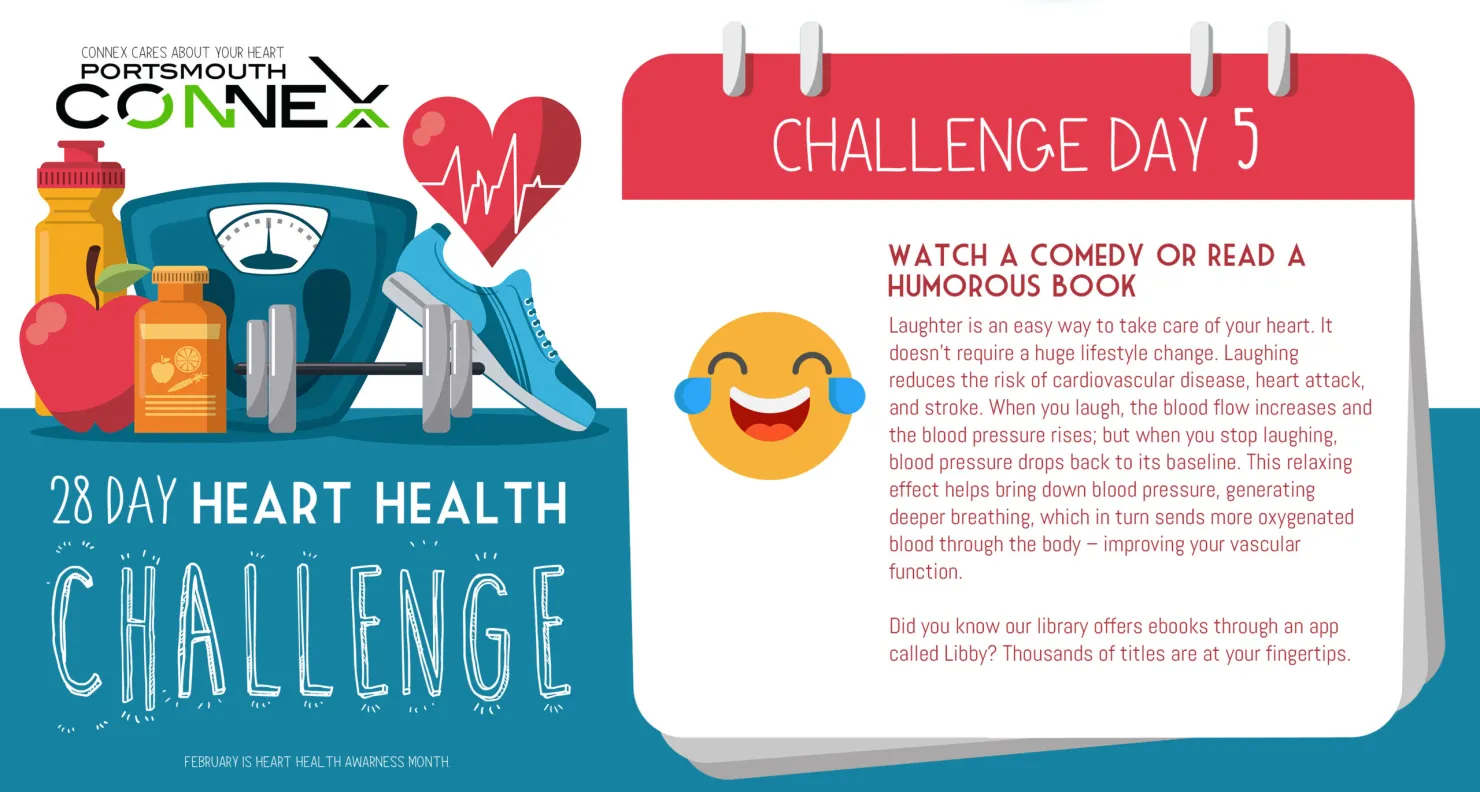 Watch a Comedy or Read a humorous book
Watch a Comedy or Read a humorous book
Laughter is an easy way to take care of your heart. It doesn’t require a huge lifestyle change. Laughing reduces the risk of cardiovascular disease, heart attack, and stroke. When you laugh, the blood flow increases and the blood pressure rises; but when you stop laughing, blood pressure drops back to its baseline. This relaxing effect helps bring down blood pressure, generating deeper breathing, which in turn sends more oxygenated blood through the body – improving your vascular function.
Did you know our library offers ebooks through an app called Libby? Thousands of titles are at your fingertips.
 Drink 32oz. of Water or more
Drink 32oz. of Water or more
Water makes up about 60% of your body weight and 72% of your brain. Every cell, tissue, and organ in your body needs water to work properly to regulate your temperature, fight fatigue, as well as lubricates and cushions your joints. Water is also critical for your heart health. Your heart is constantly working - pumping about 2,000 gallons of blood a day. By drinking more water than you are losing, you are helping your heart do its job.
It is recommended to drink 1/2 of your body weight in ounces. For example, someone who weighs 120 lbs would want to drink at least 60 fluid ounces a day.
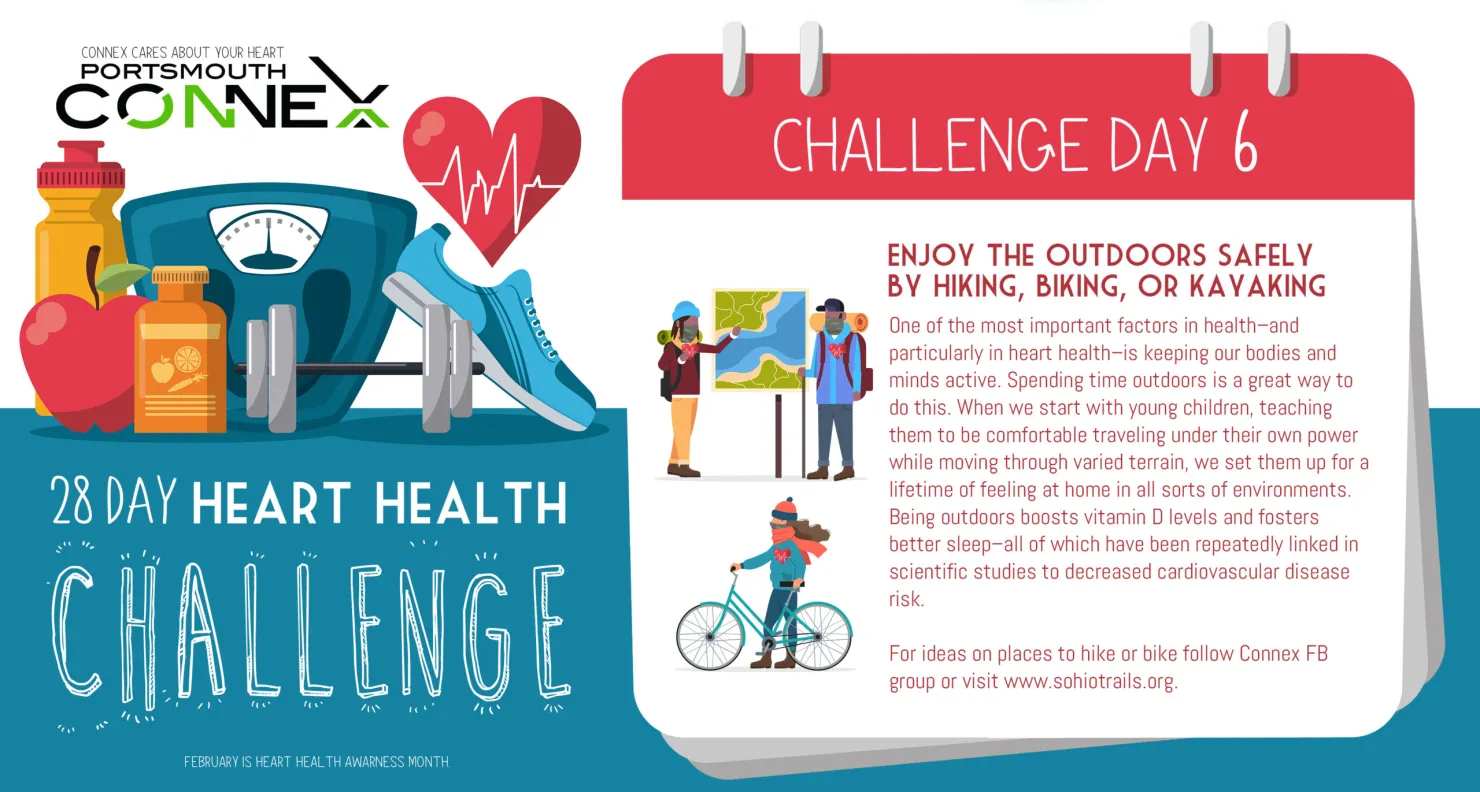 Enjoy The Outdoors Safely by Hiking, Biking or Kayaking
Enjoy The Outdoors Safely by Hiking, Biking or Kayaking
One of the most important factors in health–and particularly in heart health–is keeping our bodies and minds active. Spending time outdoors is a great way to do this. When we start with young children, teaching them to be comfortable traveling under their own power while moving through varied terrain, we set them up for a lifetime of feeling at home in all sorts of environments. Being outdoors boosts vitamin D levels and fosters better sleep–all of which have been repeatedly linked in scientific studies to decreased cardiovascular disease risk.
For ideas on places to hike or bike follow Connex FB group or visit www.sohiotrails.org
 Drink 32oz. of Water or more
Drink 32oz. of Water or more
Water makes up about 60% of your body weight and 72% of your brain. Every cell, tissue, and organ in your body needs water to work properly to regulate your temperature, fight fatigue, as well as lubricates and cushions your joints. Water is also critical for your heart health. Your heart is constantly working - pumping about 2,000 gallons of blood a day. By drinking more water than you are losing, you are helping your heart do its job.
It is recommended to drink 1/2 of your body weight in ounces. For example, someone who weighs 120 lbs would want to drink at least 60 fluid ounces a day.
 Unclutter a junk Drawer or Closet
Unclutter a junk Drawer or Closet
Let’s face it: clutter can be stressful. While most of us want that neat, ordered home environment, far too many of us live in a cluttered one that causes us stress. According to a poll on verywellmind.com, less than 10% of respondents live in a clutter-free home, and over a third live in surroundings so cluttered that they don’t even know where to begin cleaning. We suggest starting small by organizing a junk drawer or closet.
For a more organized junk drawer start by making a list of all the items you wish to include. Purchase a set of plastic trays or draw dividers for neat storage of those items. For smaller items such as batteries try using a small food container found at your local dollar store.
 Drink 32oz. of Water or more
Drink 32oz. of Water or more
Water makes up about 60% of your body weight and 72% of your brain. Every cell, tissue, and organ in your body needs water to work properly to regulate your temperature, fight fatigue, as well as lubricates and cushions your joints. Water is also critical for your heart health. Your heart is constantly working - pumping about 2,000 gallons of blood a day. By drinking more water than you are losing, you are helping your heart do its job.
It is recommended to drink 1/2 of your body weight in ounces. For example, someone who weighs 120 lbs would want to drink at least 60 fluid ounces a day.
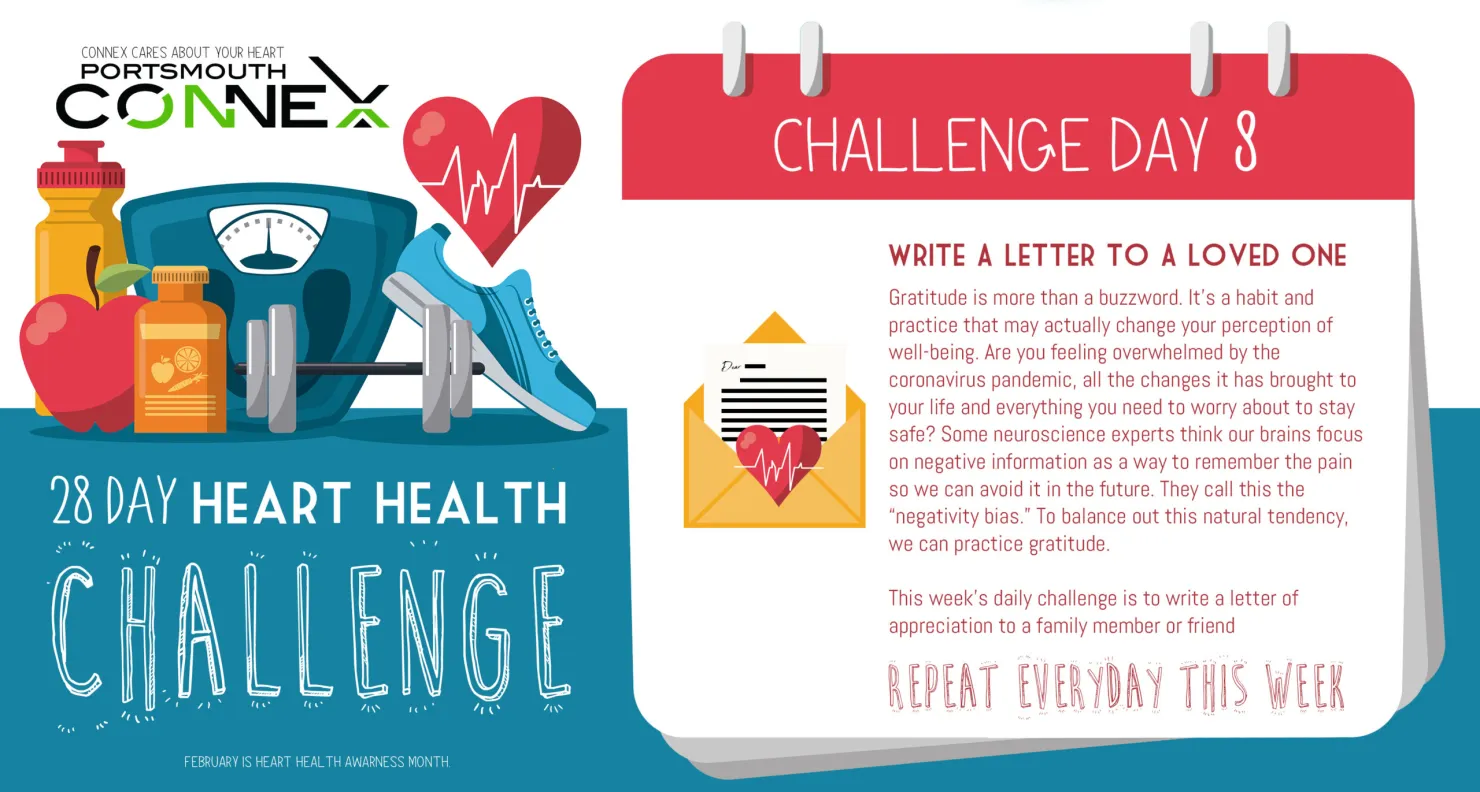 Write A Letter to A Loved one
Write A Letter to A Loved one
Gratitude is more than a buzzword. It’s a habit and practice that may actually change your perception of well-being. Are you feeling overwhelmed by the coronavirus pandemic, all the changes it has brought to your life and everything you need to worry about to stay safe? Some neuroscience experts think our brains focus on negative information as a way to remember pain so we can avoid it in the future. They call this the “negativity bias.” To balance out this natural tendency, we can practice gratitude.
This week’s daily challenge is to write a letter of appreciation to a family member or friend.

Do Something Nice for a Stranger
A 2008 study from Harvard Business School Linked different forms of generosity to better health, even among the sick and elderly. Of the elderly who volunteered for two or more organizations were 44% less likely to die over a five-year period than were non volunteers, even after controlling for their age, exercise habits, general health, and negative health habits like smoking.
Barbara Fredrickson, a pioneering happiness researcher, suggests that cultivating gratitude in everyday life is one of the keys to increasing personal happiness. “When you express your gratitude in words or actions, you not only boost your own positivity but others as well. The process reinforces kindness and strengthens the bond between one another.""
 Write A Letter to A Loved one
Write A Letter to A Loved one
Gratitude is more than a buzzword. It’s a habit and practice that may actually change your perception of well-being. Are you feeling overwhelmed by the coronavirus pandemic, all the changes it has brought to your life and everything you need to worry about to stay safe? Some neuroscience experts think our brains focus on negative information as a way to remember pain so we can avoid it in the future. They call this the “negativity bias.” To balance out this natural tendency, we can practice gratitude.
This week’s daily challenge is to write a letter of appreciation to a family member or friend.
 Hold a plank for 28 seconds- 4 sets
Hold a plank for 28 seconds- 4 sets Place forearms on the floor with elbows aligned below shoulders and arms parallel to your body at about shoulder width. If flat palms bother your wrists, clasp your hands together. Ground toes into the floor and squeeze glutes to stabilize your body. Your legs should be working, too — be careful not to lock or hyperextend your knees. To modify this position, place knees on the ground. Neutralize your neck and spine by looking at a spot on the floor about a foot beyond your hands. Your head should be in line with your back. As you get more comfortable with the move, hold your plank for as long as possible without compromising your form or breath. Engage your core by imagining your belly button pulling in toward your spine. This will help keep your torso flat and, in turn, your spine safe.
 Drink 32oz. of Water or more
Drink 32oz. of Water or more
Water makes up about 60% of your body weight and 72% of your brain. Every cell, tissue, and organ in your body needs water to work properly to regulate your temperature, fight fatigue, as well as lubricates and cushions your joints. Water is also critical for your heart health. Your heart is constantly working - pumping about 2,000 gallons of blood a day. By drinking more water than you are losing, you are helping your heart do its job.
It is recommended to drink 1/2 of your body weight in ounces. For example, someone who weighs 120 lbs would want to drink at least 60 fluid ounces a day.

Replace an Unhealthy snack with a piece of Fruit
Fruit has the power to improve your heart health. That’s because it’s loaded with nutrients that can help lower your cholesterol and blood pressure, and help you lose weight—all three of which are good for your overall heart health. Research shows that people who eat four or more servings of whole fruit a day significantly lower their risk of developing high blood pressure. Fruits are packed with fiber and are also a rich source of potassium. Both higher potassium and fiber intake help prevent hypertension and are associated with lower blood pressure among those with hypertension.
The best fruits for your heart are apples, apricots, bananas, berries, grapefruit, oranges, and peaches.
 Write A Letter to A Loved one
Write A Letter to A Loved one
Gratitude is more than a buzzword. It’s a habit and practice that may actually change your perception of well-being. Are you feeling overwhelmed by the coronavirus pandemic, all the changes it has brought to your life and everything you need to worry about to stay safe? Some neuroscience experts think our brains focus on negative information as a way to remember pain so we can avoid it in the future. They call this the “negativity bias.” To balance out this natural tendency, we can practice gratitude.
This week’s daily challenge is to write a letter of appreciation to a family member or friend.

Take a Break from Social Media
AMental health is an important part of one’s overall health and refers to a person’s emotional, psychological, and social well-being. Mental health problems can be short- or long-term, interfering with a person’s mood, behavior, thinking, and ability to relate to others. Various studies have shown depression, anxiety puts stress on the body and heart.
Studies have discovered that the more time you spend on a social media site, the more likely you are to develop depression. Additionally, the amount of time you spend on these sites is directly related to whether or not you feel stressed out or happy. If you’ve been feeling highly anxious, stressed out, or depressed, this is a good time to take a social media detox. It may feel weird at first, but your overall mood should begin to improve.
 Write A Letter to A Loved one
Write A Letter to A Loved one
Gratitude is more than a buzzword. It’s a habit and practice that may actually change your perception of well-being. Are you feeling overwhelmed by the coronavirus pandemic, all the changes it has brought to your life and everything you need to worry about to stay safe? Some neuroscience experts think our brains focus on negative information as a way to remember pain so we can avoid it in the future. They call this the “negativity bias.” To balance out this natural tendency, we can practice gratitude.
This week’s daily challenge is to write a letter of appreciation to a family member or friend.

Enjoy The outDoors Safely by Hiking, Biking, or Kayaking
AOne of the most important factors in health–and particularly in heart health–is keeping our bodies and minds active. Spending time outdoors is a great way to do this. When we start with young children, teaching them to be comfortable traveling under their own power while moving through varied terrain, we set them up for a lifetime of feeling at home in all sorts of environments. Being outdoors boosts vitamin D levels and fosters better sleep–all of which have been repeatedly linked in scientific studies to decreased cardiovascular disease risk.
For ideas on places to hike or bike follow Connex FB group or visit www.sohiotrails.org.
 Write A Letter to A Loved one
Write A Letter to A Loved one
Gratitude is more than a buzzword. It’s a habit and practice that may actually change your perception of well-being. Are you feeling overwhelmed by the coronavirus pandemic, all the changes it has brought to your life and everything you need to worry about to stay safe? Some neuroscience experts think our brains focus on negative information as a way to remember pain so we can avoid it in the future. They call this the “negativity bias.” To balance out this natural tendency, we can practice gratitude.
This week’s daily challenge is to write a letter of appreciation to a family member or friend.

Do Something Nice for a Stranger
A 2008 study from Harvard Business School Linked different forms of generosity to better health, even among the sick and elderly. Of the elderly who volunteered for two or more organizations were 44% less likely to die over a five-year period than were non volunteers, even after controlling for their age, exercise habits, general health, and negative health habits like smoking.
Barbara Fredrickson, a pioneering happiness researcher, suggests that cultivating gratitude in everyday life is one of the keys to increasing personal happiness. “When you express your gratitude in words or actions, you not only boost your own positivity but others as well. The process reinforces kindness and strengthens the bond between one another.""
 Write A Letter to A Loved one
Write A Letter to A Loved one
Gratitude is more than a buzzword. It’s a habit and practice that may actually change your perception of well-being. Are you feeling overwhelmed by the coronavirus pandemic, all the changes it has brought to your life and everything you need to worry about to stay safe? Some neuroscience experts think our brains focus on negative information as a way to remember pain so we can avoid it in the future. They call this the “negativity bias.” To balance out this natural tendency, we can practice gratitude.
This week’s daily challenge is to write a letter of appreciation to a family member or friend.
 Get up and move every hour
Get up and move every hour
Getting up and walking for two minutes every hour could help reverse the negative health effects from prolonged sitting, even if it is small amounts of light activity.
Previous studies have shown that sitting for extended periods of time every day can increase the risk of many health issues, such as heart disease, diabetes, and premature death.
Current exercise recommendations advise adults to get at least 2.5 hours of moderate physical activity each week. But 80 percent of Americans don't meet this goal.

Relax with Aromatherapy
According to a study performed by the Mayo Clinic, aromatherapy has been proven to do the following:
Barbara Fredrickson, a pioneering happiness researcher, suggests that cultivating gratitude in everyday life is one of the keys to increasing personal happiness. “When you express your gratitude in words or actions, you not only boost your own positivity but others as well. The process reinforces kindness and strengthens the bond between one another.""
 Get up and move every hour
Get up and move every hour
Getting up and walking for two minutes every hour could help reverse the negative health effects from prolonged sitting, even if it is small amounts of light activity.
Previous studies have shown that sitting for extended periods of time every day can increase the risk of many health issues, such as heart disease, diabetes, and premature death.
Current exercise recommendations advise adults to get at least 2.5 hours of moderate physical activity each week. But 80 percent of Americans don't meet this goal.

28 Jumping Jacks - 4 sets
Stand upright with your legs together, arms at your sides. Bend your knees slightly, and jump into the air. As you jump, spread your legs to be about shoulder-width apart. Stretch your arms out and over your head. Jump back to the starting position. Repeat 27 times for four sets.
Increase intensity by adding dumbbells or ankle weights. You can also try jumping jacks with a squat.
 Get up and move every hour
Get up and move every hour
Getting up and walking for two minutes every hour could help reverse the negative health effects from prolonged sitting, even if it is small amounts of light activity.
Previous studies have shown that sitting for extended periods of time every day can increase the risk of many health issues, such as heart disease, diabetes, and premature death.
Current exercise recommendations advise adults to get at least 2.5 hours of moderate physical activity each week. But 80 percent of Americans don't meet this goal.

Eat a Heart Health Food at Every Meal
Heart disease accounts for nearly one-third of all deaths worldwide. Diets play a major role in heart health and can impact your risk of heart disease. In fact, certain foods can influence blood pressure, triglycerides, cholesterol levels, and inflammation, all of which are risk factors for heart disease.
List of 15 heart-healthy foods:
 Get up and move every hour
Get up and move every hour
Getting up and walking for two minutes every hour could help reverse the negative health effects from prolonged sitting, even if it is small amounts of light activity.
Previous studies have shown that sitting for extended periods of time every day can increase the risk of many health issues, such as heart disease, diabetes, and premature death.
Current exercise recommendations advise adults to get at least 2.5 hours of moderate physical activity each week. But 80 percent of Americans don't meet this goal.

Slow Down and Watch the Sunset
We all know just how romantic, inspiring and utterly Instagram-able they can be, but most of us only make time for sunsets when we're on vacation as if that calming, beautiful moment can only occur when we're in an exotic place, free from everyday obligations.
Here are ways to infuse some wonder and awe into your daily routine. 1. It can slow downtime. By witnessing the beauty and awe of the sunset, you can slow down your perception of time. 2. It doesn't take long and it forces you outside. Taking a few minutes out of your day to experience some of the golden hour will be worth it. 3. It allows you to multitask healthily. You can take in the sunset in a variety of ways: while running, walking, biking, or simply observing. 5.It will force you to put your phone down. When we relegate the experience of sunsets to vacations and special occasions, we feel the urge to document -- in hopes of remembering that wondrous feeling. But if you experience the sunset more regularly, you'll no longer feel compelled to see it through a screen.
 Get up and move every hour
Get up and move every hour
Getting up and walking for two minutes every hour could help reverse the negative health effects from prolonged sitting, even if it is small amounts of light activity.
Previous studies have shown that sitting for extended periods of time every day can increase the risk of many health issues, such as heart disease, diabetes, and premature death.
Current exercise recommendations advise adults to get at least 2.5 hours of moderate physical activity each week. But 80 percent of Americans don't meet this goal.

Enjoy The outDoors Safely by Hiking, Biking, or Kayaking
One of the most important factors in health–and particularly in heart health–is keeping our bodies and minds active. Spending time outdoors is a great way to do this. When we start with young children, teaching them to be comfortable traveling under their own power while moving through varied terrain, we set them up for a lifetime of feeling at home in all sorts of environments. Being outdoors boosts vitamin D levels and fosters better sleep–all of which have been repeatedly linked in scientific studies to decreased cardiovascular disease risk.
For ideas on places to hike or bike follow Connex FB group or visit www.sohiotrail.org
 Get up and move every hour
Get up and move every hour
Getting up and walking for two minutes every hour could help reverse the negative health effects from prolonged sitting, even if it is small amounts of light activity.
Previous studies have shown that sitting for extended periods of time every day can increase the risk of many health issues, such as heart disease, diabetes, and premature death.
Current exercise recommendations advise adults to get at least 2.5 hours of moderate physical activity each week. But 80 percent of Americans don't meet this goal.
 Clean Your Fridge
Clean Your Fridge
According to the FDA Food Code, all perishable foods that are opened or prepared should be thrown out after 7 days, maximum. No leftovers should survive in your fridge for longer than that. Some foods should be even be thrown away before the 7-day mark.
If you want your leftovers to last longer, freeze them. Just be sure to keep track of how long you had it in the fridge before you put it in the freezer. Freezing stops bacterial growth in its tracks like a car at a red light. When you thaw your food, however, the light turns green and bacterial growth continues from where it left off. So, according to the chart below, steak that was in the fridge for 3 days before it was frozen will be good for 1 to 2 days after it is thawed.
 Get up and move every hour
Get up and move every hour
Getting up and walking for two minutes every hour could help reverse the negative health effects from prolonged sitting, even if it is small amounts of light activity.
Previous studies have shown that sitting for extended periods of time every day can increase the risk of many health issues, such as heart disease, diabetes, and premature death.
Current exercise recommendations advise adults to get at least 2.5 hours of moderate physical activity each week. But 80 percent of Americans don't meet this goal.
 Practice Gratitude
Practice Gratitude
Did you know that grateful people experience fewer aches and pains and report feeling healthier and sleep better than those who do not practice gratitude? Not surprisingly, grateful people are also more likely to take care of their health. They exercise more often and are more likely to attend regular check-ups, which is likely to contribute to further longevity.
Your task for the next 6 days is to write down 5 things you are grateful for, trying not to repeat yourself. It could be something as simple as a cup of coffee or a comfy blanket.
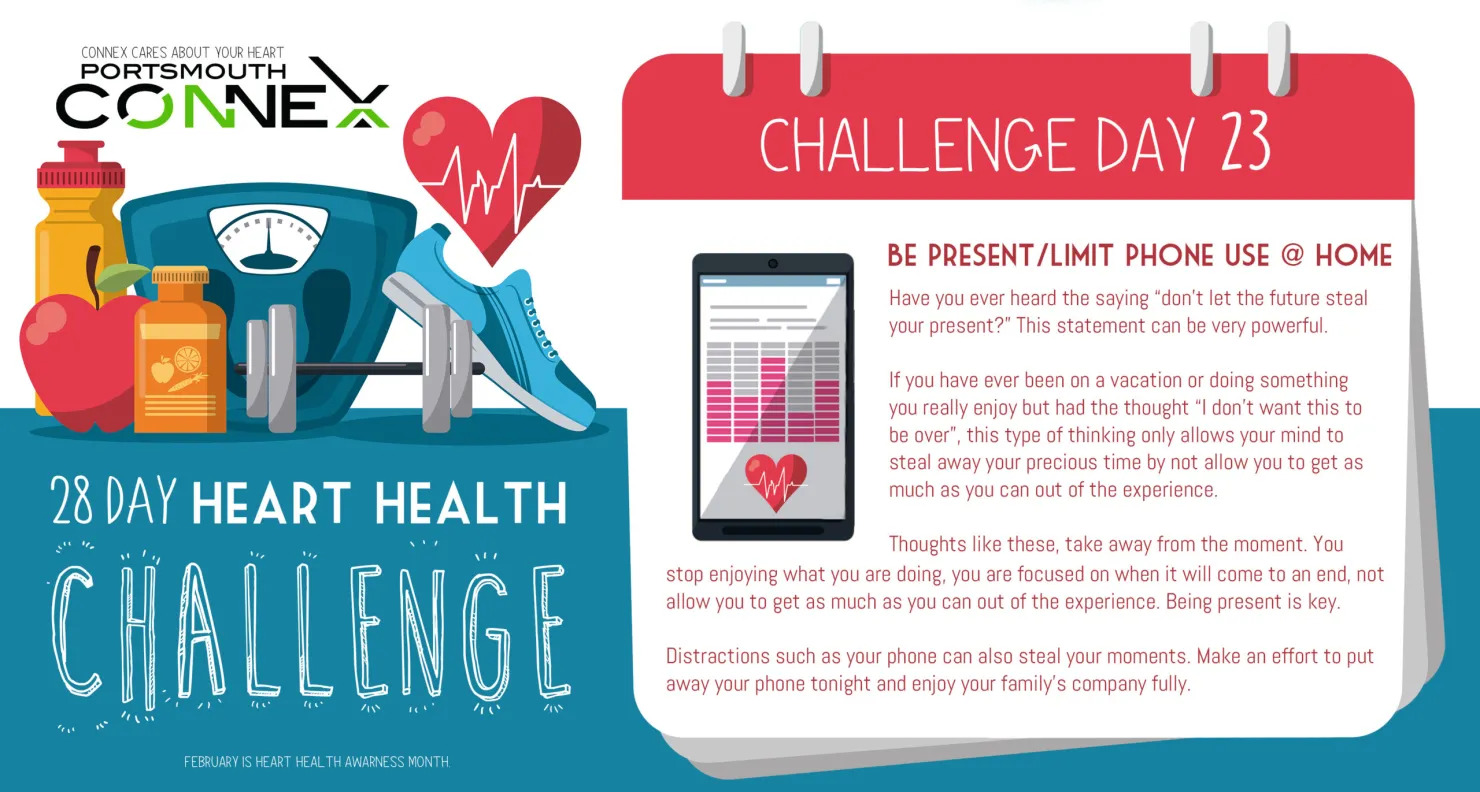 Be Present/Limit Phone use @ home
Be Present/Limit Phone use @ home
Have you ever heard the saying “don’t let the future steal your present?” This statement can be very powerful.
If you have you ever been on a vacation or doing something you really enjoy but had the thought “I don’t want this to be over”. This type of thinking only allows your mind to steal away your precious time.
Thoughts like these, take away from the moment. You stop enjoying what you are doing, you are focused on when it will come to an end, not allow you to get as much as you can out of the experience.
Distractions such as your phone can also steal your present. Make an effort to put away your phone tonight and enjoy your families company fully.
 Practice Gratitude
Practice Gratitude
Did you know that grateful people experience fewer aches and pains and report feeling healthier and sleep better than those who do not practice gratitude? Not surprisingly, grateful people are also more likely to take care of their health. They exercise more often and are more likely to attend regular check-ups, which is likely to contribute to further longevity.
Your task for the next 6 days is to write down 5 things you are grateful for, trying not to repeat yourself. It could be something as simple as a cup of coffee or a comfy blanket.
 28 Mountain Climbers - 4 sets
28 Mountain Climbers - 4 sets
Start in a plank position, making sure to distribute your weight evenly between your hands and your toes.Check your form—your hands should be about shoulder-width apart, back flat, abs engaged, and head in alignment. Pull your right knee into your chest as far as you can. Switch legs, pulling one knee out and bringing the other knee in. Keep your hips down, run your knees in and out as far and as fast as you can. Alternate inhaling and exhaling with each leg change. Avoid bouncing on your toes.
 Practice Gratitude
Practice Gratitude
Did you know that grateful people experience fewer aches and pains and report feeling healthier and sleep better than those who do not practice gratitude? Not surprisingly, grateful people are also more likely to take care of their health. They exercise more often and are more likely to attend regular check-ups, which is likely to contribute to further longevity.
Your task for the next 6 days is to write down 5 things you are grateful for, trying not to repeat yourself. It could be something as simple as a cup of coffee or a comfy blanket.
 Avoid Processed Foods
Avoid Processed Foods
Improving your diet lowers your risk for heart disease in many ways, including helping to lower high cholesterol, blood pressure, and blood sugar and insulin levels, as well as preventing obesity and improving the function of your heart and blood vessels.
If you are watching your heart health, the following foods should not make it onto your meal plan very often. In fact, if you can cut them out of your diet, your heart will be healthier for it.
White bread, white rice, low-fiber breakfast cereals, sweets and sugars, and other refined or processed carbohydrates should be avoided today. The processing of these foods removes many of the most healthful components in whole grains, such as dietary fiber, minerals, phytochemicals, and fatty acids.
 Practice Gratitude
Practice Gratitude
Did you know that grateful people experience fewer aches and pains and report feeling healthier and sleep better than those who do not practice gratitude? Not surprisingly, grateful people are also more likely to take care of their health. They exercise more often and are more likely to attend regular check-ups, which is likely to contribute to further longevity.
Your task for the next 6 days is to write down 5 things you are grateful for, trying not to repeat yourself. It could be something as simple as a cup of coffee or a comfy blanket.
 Reconnect with an old Friend
Reconnect with an old Friend
According to the Annals of Behavioral Medicine, 15-30% of people are chronically lonely, a condition that extends to both people under 18 and over 65. Loneliness can be especially concerning for seniors 70 and up because it develops slowly. Over time, people fall out of touch with old friends, children visit less, and social calendars decline.
Psychology Today reports that people in their 50’s can curb encroaching isolation through the joy of reunions. Everyone has that old friend they wonder about. Our lives can get so busy, we fall out of touch. Or we think about that person from long ago and wonder if they remember us, or if they’d want to hear from us again. Regardless of your age, reuniting with that person can bring a wealth of benefits both physical and psychological - curbing stress and creating a heart-healthy moment.
 Practice Gratitude
Practice Gratitude
Did you know that grateful people experience fewer aches and pains and report feeling healthier and sleep better than those who do not practice gratitude? Not surprisingly, grateful people are also more likely to take care of their health. They exercise more often and are more likely to attend regular check-ups, which is likely to contribute to further longevity.
Your task for the next 6 days is to write down 5 things you are grateful for, trying not to repeat yourself. It could be something as simple as a cup of coffee or a comfy blanket.
 Enjoy The outDoors Safely by Hiking, Biking or Kayaking
Enjoy The outDoors Safely by Hiking, Biking or Kayaking
Have you ever heard the saying “don’t let the future steal your present?” This statement can be very powerful.
One of the most important factors in health–and particularly in heart health–is keeping our bodies and minds active. Spending time outdoors is a great way to do this. When we start with young children, teaching them to be comfortable traveling under their own power while moving through varied terrain, we set them up for a lifetime of feeling at home in all sorts of environments. Being outdoors boosts vitamin D levels and fosters better sleep–all of which have been repeatedly linked in scientific studies to decreased cardiovascular disease risk.
For ideas on places to hike or bike follow Connex FB group or visit www.sohiotrails.org.
 Practice Gratitude
Practice Gratitude
Did you know that grateful people experience fewer aches and pains and report feeling healthier and sleep better than those who do not practice gratitude? Not surprisingly, grateful people are also more likely to take care of their health. They exercise more often and are more likely to attend regular check-ups, which is likely to contribute to further longevity.
Your task for the next 6 days is to write down 5 things you are grateful for, trying not to repeat yourself. It could be something as simple as a cup of coffee or a comfy blanket.
 Declutter your Inbox
Declutter your Inbox
Does sorting through your emails take longer than you deem necessary? Is a day out of the office, or back-to-back meetings guarantee an inbox of hundreds of unread emails? Just keeping up with your inbox could easily be your full-time job, except for the fact that you wouldn’t cross a single thing off your to-do list.
Here are a few simple ways to declutter your inbox and stop wasting time or sacrificing productivity.
1.Set up Priority Inbox with Gmail, which automaticly filters your emails by important and nonimportant. 2. Use Boomerang, a free plug-in for Firefox and Chrome with Gmail that allows you to do things like schedule an email to send later. 3. If you delet an email that you are suvscribed to, that you wont even read, unsubscribe. 4. Use your calendar rather than your inbox as a reminder.
 Practice Gratitude
Practice Gratitude
Did you know that grateful people experience fewer aches and pains and report feeling healthier and sleep better than those who do not practice gratitude? Not surprisingly, grateful people are also more likely to take care of their health. They exercise more often and are more likely to attend regular check-ups, which is likely to contribute to further longevity.
Your task for the next 6 days is to write down 5 things you are grateful for, trying not to repeat yourself. It could be something as simple as a cup of coffee or a comfy blanket.
